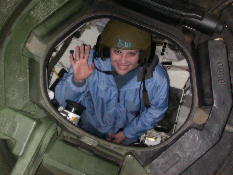June 19, 2009
I'm sorry, but I've just never bought into the idea that Afghanistan is the "good war." My husband has actually had someone say to him that at least his upcoming deployment is to Afghanistan, which serves a purpose and has meaning, unlike Iraq. I wholeheartedly reject that idea. I also disagree vehemently with Pres Obama when he said, "Unlike Afghanistan, Iraq was a war of choice..." As Neal Boortz said recently, all wars are a choice. None of the 9/11 hijackers came from Afghanistan, so please explain to me how Afghanistan wasn't a choice that was made.
I've been thinking about Afghanistan a lot lately, and I have a hard time feeling good about my husband going there. Frankly, I am not convinced that country deserves his effort.
Ralph Peters:
[Petraeus] doesn't seem to grasp that, while al Qaeda was a foreign and ultimately unwanted presence in Iraq, the Taliban's the home team in Afghanistan. Afghan tribesmen just don't share our interests. And Iraq's a state. Afghanistan's an accident.
Interestingly enough, my husband said the exact same thing this morning when I said I wanted to work on my Afghanistan post. Iraq had a history of being governed; Afghanistan doesn't. So what is our goal?
This very thing was discussed on the final panel at the Milblogs Conference this year. Bill Roggio, Andrew Exum, and Bill Nagle all kinda shrugged their shoulders and expressed an inability to decipher what the Obama administration's end goal is in Afghanistan. Even if you disagree with the shifting goals in Iraq, at least most people can articulate what they were: finding WMDs, bringing democracy, leaving Iraq with some sort of intact system of government. Can the layman come up with any proposed goal in Afghanistan? I can't, other than, um, kill al Qaeda?
And maybe that in itself is the goal. It is according to Ralph Peters:
But when does it end? Americans squawked that we had no "exit strategy" in Iraq, but holy cow, what is the exit strategy for a war of attrition? Then you're in GEN LeMay territory: "If you kill enough of them, they stop fighting." Do we stay in Afghanistan until every terrorist is dead? I don't think that is really a true goal, certainly not an attainable one.
And I don't even think that is the Obama goal, otherwise he would not be doing this:
[...]
"We are building an army they will never be able to afford," a senior U.S. military official told McClatchy.
I am by no means smart about these things. But it seems to me that we Americans are being naive about Afghanistan, even more naive than we were in Iraq.
This Michael Scheuer excerpt (via Amritas) rings true and worries me:
This, of course, has never occurred in the wake of a Western intervention in a Muslim country. Islam invariably becomes more, not less, important to the inhabitants of an invaded Muslim country, and while improvements in water, disease resistance, and schoolbooks are appreciated, they are not religiously transforming. We simply end up with Muslims who are better educated, healthier, and more militantly Islamic. This has happened in countries (Somalia, Afghanistan, Iraq, and several of the Balkan states) and in prison camps; in Guantanamo Bay, for example, we are building a truly dedicated and virulently anti-U.S. mujahedin battalion, the members of which will have the best-cared-for teeth in the Islamic world. But through it all, U.S. and Western leaders, the UN, and untold numbers of NGO spokespersons continue to sell shopworn lies to Western electorates-that nation-building will yield secularists who will desire only to live in peace with their Western conquerors.
I think we project too much onto a people and culture we simply cannot grok. Our American mantra that all men desire to be free may just not apply. (Read The Places In Between if you want to be horrified by the Afghan midset.) And eight years into this clash, we still are making monumental and basic mistakes, even at the highest levels: US envoy Holbrooke just made an enormous cultural faux-pas. Afghanistan bloggers caught the gaff and flipped out; how is the "Special Representative for Afghanistan and Pakistan under the Obama administration" making such mistakes while bloggers know better? (To echo J.G. Thayer and my husband, please show us that "smart diplomacy" and distinguish yourself from yokel Bush whenever you're ready.) How is it that my husband has arguments at work about the definitions of counter-terrorism and counter-insurgency, with the very people who are supposed to know the difference and carry it out? How can "experts" still be so under-educated and naive about something that's been going on for eight years?
I am murky about what I should hope for in Afghanistan. What are the benchmarks? What does success look like? What is my husband's role?
And how long will this take?
Steven den Beste a few days after 9/11: "The progress and spread of freedom worldwide will continue; this war won't end for centuries." [emphasis mine, because the enormity of that thought is horrifying]
I find the whole thing quite stressful, and I am not ready to send my husband to Afghanistan. I personally thought Iraq was the battle of the long war I could get behind. I am having a harder time working up the emotional investment this milspouse needs to send her husband off to fight.
I am not ready for my husband to join a new front in a war that won't end for centuries.
UPDATED:
I meant to add this originally and forgot. I just wanted to put links to the blogs my husband's been reading that cover Afghanistan-related issues:
Registan.net
Ghosts of Alexander
Small Wars Journal
The Long War Journal
I probably need to start reading them too.
Posted by: Sarah at
11:44 AM
| Comments (8)
| Add Comment
Post contains 1169 words, total size 9 kb.
I linked here from the Castle. This past week, I had the pleasure of meeting a Major who flies Blackhawks and was working with the command staff in Afghanistan. She told me something that gave me a whole new perspective on war, especially the one in Afghanistan. In a nutshell, it is not about killing the enemy but raising their sights. Their standard of living. Their ability to have for themselves and their country what other western countries have. To reject terrorism as being self-defeating of attaining those goals. While we have always had that as part of the 'hearts and minds' approach, in Afghanistan it means that literacy is a big part of changing those minds and hearts.
It could take years, but if they can read and think for themselves early on, it won't take as long. I just wish that I could remember everything she (this major) told me, but I went away from that conversation thinking that we are on the right track because it is working, but instead of taking a generation, it will be less than that, and by that time, two generations will be affected.
As Americans, we tend to want instant gratification because we are sort of hard-wired that way. We forget that the Middle East is essentially not that way because of religion, culture and the tribes.
Anyway, excellent post and thought-provoking.
Posted by: Cricket at June 20, 2009 12:41 PM (odsR+)
Posted by: ry at June 20, 2009 09:57 PM (QXUfZ)
Posted by: ry at June 20, 2009 10:01 PM (QXUfZ)
I could go on and on, but I have to go to breakfast, and then the airport, so for now, I'll just respond to Cricket. Given the failure of government programs to uplift Americans in America, would a gigantic multi-generational American government uplift program have a chance to succeed in a foreign country? I'm pretty sure the answer is no. Maybe a new Iran is the best hope for a better Afghanistan. More later.
Posted by: Amritas at June 20, 2009 10:03 PM (/IwHi)
"I will never tell the city why I appointed these three hundred. I will never tell the Three Hundred themselves. But I now tell you.
"I chose them not for their own valor, lady, but for that of their women...
"Greece stands now on her most perilous hour. If she saves herself, it will not be at the Gates ...but later, in battles yet to come, by land and sea.Then Greece, if the gods will it, will preserve herself...
"When the battle is over, when the 300 have gone down to death, then will all Greece look to the Spartans, to see how they bear it.
"But who, ladies, who will the Spartans look to? To you. To you and the other wives and mothers, sisters and daughters of the fallen.
"If they behold your hearts riven and broken with grief, they too will break. And Greece will break with them. But if you bear up, dry-eyed, not alone enduring your loss but seizing it with contempt for it's agony and embracing it as the honor that it is in truth, then Sparta will stand and all Hellas will stand behind her.
"Why have I nominated you, lady, to bear up beneath this most terrible of trials, you and your sisters of the Three Hundred? Because you can."
- Leonidas, in Stephen Pressfield's Gates of Fire.
Posted by: Greyhawk at June 20, 2009 10:25 PM (/tYJS)
Posted by: SGT B at June 20, 2009 11:42 PM (dX9rw)
And that's something that is better learned by observation than from a book. Or a web page. For this question, perhaps the best basic text would be Aristotle's Politics. But Aristotle was far from politically correct.
Since you use Robert Heinlein's grok properly - a couple of bucks at the used book store should buy a copy of Heinlein's Starship Trooper. The basics are there, and expanded upon in his Time Enough for Love. As they are in his collected short stories, The Past Through Tomorrow.
Or pick up a copy of Rose Wilder Lane's "The Discovery of Freedom." When it was new our Civics Teacher assigned it to my class. The 1850's history Mrs. Lane used was outdated when the book was written - but her conclusions are exactly right. So it's worth a read
You should be able to finish all three in a couple of afternoons, although you might skip parts of "Love."
But basically, we are in Afghanistan because our eventual survival depends on it. Not our survival as a country - our personal survival.
The survival of yourself and of your children. And of everyone around you and their children.
Because the aim of the Talib and other Islamic groups is to enslave the rest of the world. Ostensibly for Allah - actually for their own power and profit. And that puts all our lives in peril.
Stranger
Posted by: Stranger at June 21, 2009 01:01 AM (uu3eD)
Another sometime-denizen of the Castle checking in. Your post gave me chills of the worst sort, after seeing transports streaming out of McChord AFB on Saturday. I know holidays don't REALLY mean much in the grand scheme of things, but, the day before Father's day, away they go. To what end? How do we end the very last membef of the Taliban? Do we need to end the people that replace them too?
I don't know either. And that does not make me happy.
Posted by: MCart at June 22, 2009 01:43 PM (z9gCU)
49 queries taking 0.1494 seconds, 205 records returned.
Powered by Minx 1.1.6c-pink.














